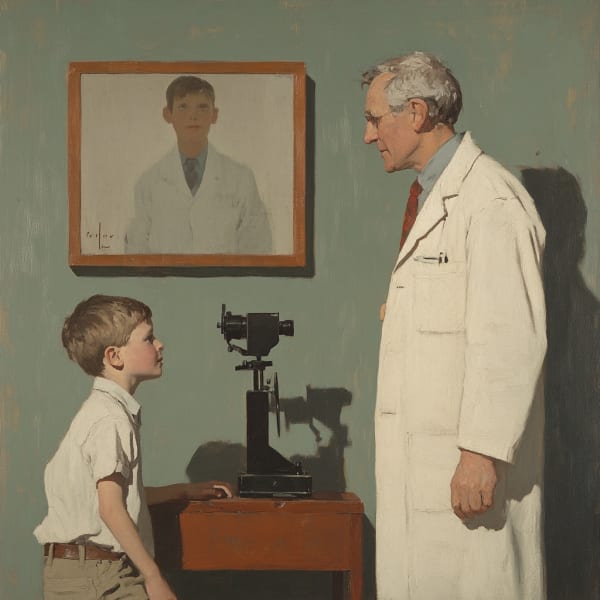A Poke In The Eye

About a week ago, I noticed mild, subtle blurriness in my vision in my right eye, like smudges on a camera lens. On Monday I went to my eye doctor about it; they saw what looked like hemorrhaging on the retina and said I should see a specialist ASAP. It’s never good news when a doctor gets on the phone with another doctor, trying to get you in to see them the same day if possible.
Retina problems can happen randomly, but are usually complications of aging, high blood pressure, or diabetes. The retina clinic I was referred to is part of a local chain of retina clinics, my first experience with a particularly weird genre of American healthcare focused on managing chronic health problems at mass-market scale, a category that also includes storefront dialysis centers found in hundreds of small American towns. As far as I could tell, I (at 42) was the youngest patient there by at least 5 years, probably 10.
Nurses performed basic eye exams, checked my eye pressure, and took scans of the insides of my eyes. The retina specialist came in, checked a few more things (while also talking to a medical scribe over AirPods, which he apologized for), then diagnosed me with a central retinal vein occlusion (CRVO) — a tiny blood clot causing swelling in the part of the eye that sees fine details.
Earlier this year I was also diagnosed with stage 2 hypertension, which I’m now trying to manage with medication; Occam’s Razor would say that’s why my eye is now blurry, though while high blood pressure can be a risk factor for CRVO, it can also just happen. And, strictly speaking, my problem isn’t the occlusion — a person can have a partially blocked vein in their eyeball with no symptoms and never know they had it — but the swelling it’s causing.
The swelling is why my vision is wonky — the central part of my retina is pooched outward, blurring what I see. I can no longer read smaller text clearly with my right eye, but color and motion are fine. My left eye’s sight is still excellent, so overall, I can still see.
It’s just that I have that ‘smudged lens’ effect, and I only have full sight if I can look at something with my left side. Turning my head away from my computer screen to the left makes it so I can’t read it.
Since the mid-2000s there’s been a reliable standard of care for RVO-related swelling, using a drug that inhibits a protein called VEGF that the body emits when it thinks it needs to regrow blood vessels, which my body does. In mild cases like mine, the extra VEGF causes tiny amounts of blood and fluid to leak into part the macula (the central part of the retina, responsible for seeing fine details), which have built up and are now messing with my vision. Over time, if not treated, my body could decide it needs to grow extra blood vessels, fragile roads to nowhere that could leak more blood and cause total vision loss in that eye.
Either way, the solution is to tell my body to stop spewing VEGF in the area around the blocked vein, and the prognosis for younger people with mild CRVO is often very good. My doctor thinks my vision should fully recover with this treatment.
Mine is “non-ischemic” CRVO, which is a milder type where blood flow is generally good but with these tiny leaks into the macula. “Ischemic” CRVO — where the blood flow is blocked more, cutting off some oxygen to the eye — tends to result in worse vision loss, with worse chances of recovery.
As it happens, the retina clinic I went to (chosen because it’s near my house, across from Five Guys) is running a clinical trial for a new anti-VEGF dosage/schedule. The standard of care for my condition — whose full, pedantic name is macular edema secondary to CRVO — is to anesthetize my eye, clamp it open, and inject an anti-VEGF medication called EYLEA® into my macula, every four weeks until the swelling has gone away and stayed gone for at least 2 months.
The clinical trial is to see if different dosages and schedules for this same treatment could be more effective, though because it’s a double-blind study, even if I were in the cohort that received injections less often they would still have me come in, get numbed, and have my eye clamped open — it’s just that, every other visit, they would only pretend to jab something into my eye. I’m volunteering for this study not least because they’ll pay for Ubers to and from the clinic, and this way I don’t need to negotiate whether my wife or I gets the car those days.